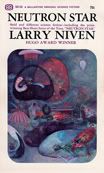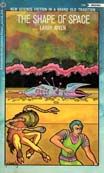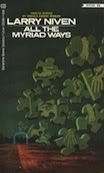2011 books
There is so much overlap in Niven's early short story collections that untangling them all into his various story threads (Draco Tavern, Known Space, State, Svetz, etc.) can be a tricky business. Over the last few weeks I've begun to go through them and pick apart each collection, filling in the gaps of the stories I'd not yet read with frequent reference to Niven's complex ISFDb entry. Here are the first three.



30) Larry Niven, Neutron Star, 1968
Niven's first collection comprised entirely of eight Known Space stories from 1966 to 1968, none of which reappeared in subsequent collections until 1991's Playgrounds of the Mind. This is Niven as most like to remember him: lucid, great dialogue and interplay between his characters, a prodigious imagination and a clear ability to hold it all together. Many of the stories are focussed on Beowulf Schaeffer who appears frequently throughout Known Space stories, and my favourite here is certainly the novelette 'Flatlander' which was nominated for a 1968 Nebula.
31) Larry Niven, The Shape of Space, 1969
More diverse in themes than Neutron Star but there are still five new Known Space stories, one of which is the first Gil Hamilton police procedural 'Death by Ecstasy'. The highlight for me is a rare non-genre story, 'The Deadlier Weapon', about a possible course of action in the event you get carjacked by a hitchhiker - it has an infallible logic, but it's a very risky option. There's also the vaguely disturbing (and Nebula-nominated) 'Bordered in Black', still a dark and twisted vision. Roughly half of this collection reappeared in Niven's Convergent Series a decade later.
32) Larry Niven, All the Myriad Ways, 1971
Three new Known Space stories, one from the Magic Goes Away universe, one from the Time Travel series and one from State, plus six stand-alones including the very well known (and still outrageous) essay 'Man of Steel, Woman of Kleenex'. That along with two other essays on teleportation and time travel set the tone for some of his later collections that also mixed fiction with non-fiction. 'Jigsaw Man' could have done with the added punch provided by its afterword from 'Dangerous Visions', but my favourite here is probably 'Not Long Before the End', the Magic Goes Away story that sets magic as a finite resource. It displays Niven's knack for great dialogue, and along with his essays is also a story that shows off well how Niven thinks about science.



30) Larry Niven, Neutron Star, 1968
Niven's first collection comprised entirely of eight Known Space stories from 1966 to 1968, none of which reappeared in subsequent collections until 1991's Playgrounds of the Mind. This is Niven as most like to remember him: lucid, great dialogue and interplay between his characters, a prodigious imagination and a clear ability to hold it all together. Many of the stories are focussed on Beowulf Schaeffer who appears frequently throughout Known Space stories, and my favourite here is certainly the novelette 'Flatlander' which was nominated for a 1968 Nebula.
31) Larry Niven, The Shape of Space, 1969
More diverse in themes than Neutron Star but there are still five new Known Space stories, one of which is the first Gil Hamilton police procedural 'Death by Ecstasy'. The highlight for me is a rare non-genre story, 'The Deadlier Weapon', about a possible course of action in the event you get carjacked by a hitchhiker - it has an infallible logic, but it's a very risky option. There's also the vaguely disturbing (and Nebula-nominated) 'Bordered in Black', still a dark and twisted vision. Roughly half of this collection reappeared in Niven's Convergent Series a decade later.
32) Larry Niven, All the Myriad Ways, 1971
Three new Known Space stories, one from the Magic Goes Away universe, one from the Time Travel series and one from State, plus six stand-alones including the very well known (and still outrageous) essay 'Man of Steel, Woman of Kleenex'. That along with two other essays on teleportation and time travel set the tone for some of his later collections that also mixed fiction with non-fiction. 'Jigsaw Man' could have done with the added punch provided by its afterword from 'Dangerous Visions', but my favourite here is probably 'Not Long Before the End', the Magic Goes Away story that sets magic as a finite resource. It displays Niven's knack for great dialogue, and along with his essays is also a story that shows off well how Niven thinks about science.